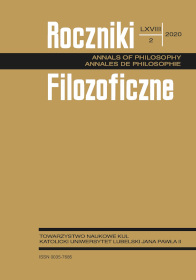Descartes (and Spinoza) on Intellectual Experience and Skepticism
Descartes (and Spinoza) on Intellectual Experience and Skepticism
Author(s): John CarrieroSubject(s): Philosophy, History of Philosophy, Epistemology, Renaissance Philosophy, Early Modern Philosophy
Published by: Towarzystwo Naukowe KUL & Katolicki Uniwersytet Lubelski Jana Pawła II
Keywords: epistemology; indubitability; consciousness; skepticism; intuition
Summary/Abstract: Descartes’s epistemology is rooted in his profound interest in and respect for what might be called intellectual experience, especially lucid intellectual experience. (Lucid intellectual experience is my term for what Descartes calls perceiving clearly and distinctly.) This interest, it seems to me, was shared by Descartes’s rationalist successors Spinoza and Leibniz. In the first part of this paper, I locate the phenomenon of lucid intellectual experience, focusing on Descartes and Spinoza. I try to show if we do not give enough attention to the character of such experience, we risk losing touch with a central motivation behind their respective epistemologies. In the second part of the paper, I consider intellectual experience in the context of skeptical doubt, particularly radical doubt. Although Descartes and Spinoza are often taken to be opposed here, I think they share more than is commonly appreciated.
Journal: Roczniki Filozoficzne
- Issue Year: 68/2020
- Issue No: 2
- Page Range: 21-42
- Page Count: 22
- Language: English

